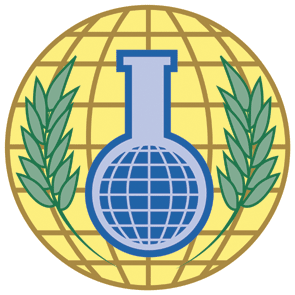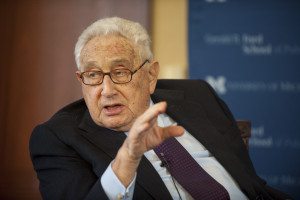Nobel Peace Prize: Political weapon of choice
 Peace can be a difficult concept to define. Conflict, particularly in its armed variant, is simpler. There is certainly no difficulty in recognising the bloody Civil War that Syria is currently fighting amongst itself, nor its destructive impact on the lives of those within and surrounding the bitterly divided country. Governments, East and West, have no compelling excuse for their continued inaction. Between the two voting blocs in the UN—one supporting the current Syrian government, the other broadly against it—there is at least agreement that peace is the ultimate goal of discussion. However, neither side is willing to forfeit a strategic regional advantage for a lasting peace; not when the only casualties of delay and obstructionism are the Syrian people themselves. It is poker played with a stranger’s money, warranting no concern over how much is lost in pursuit of the pot. Awarding the Nobel Peace Prize to the Organisation for the Prohibition of Chemical Weapons (OPCW) should, given this situation, be seen as an unwelcome development in the nature of the debate around Syria. David Miliband makes a good case by pointing out that if the group truly deserved their laureate status, Syria should not have been in a position to use chemical weapons in the first place. A significant criticism stems from the historical connotations of a Nobel Peace Prize victory, and what it signals in terms of our attitude toward the conflict.
Peace can be a difficult concept to define. Conflict, particularly in its armed variant, is simpler. There is certainly no difficulty in recognising the bloody Civil War that Syria is currently fighting amongst itself, nor its destructive impact on the lives of those within and surrounding the bitterly divided country. Governments, East and West, have no compelling excuse for their continued inaction. Between the two voting blocs in the UN—one supporting the current Syrian government, the other broadly against it—there is at least agreement that peace is the ultimate goal of discussion. However, neither side is willing to forfeit a strategic regional advantage for a lasting peace; not when the only casualties of delay and obstructionism are the Syrian people themselves. It is poker played with a stranger’s money, warranting no concern over how much is lost in pursuit of the pot. Awarding the Nobel Peace Prize to the Organisation for the Prohibition of Chemical Weapons (OPCW) should, given this situation, be seen as an unwelcome development in the nature of the debate around Syria. David Miliband makes a good case by pointing out that if the group truly deserved their laureate status, Syria should not have been in a position to use chemical weapons in the first place. A significant criticism stems from the historical connotations of a Nobel Peace Prize victory, and what it signals in terms of our attitude toward the conflict.
The Peace Prize Committee is not blind to the prestige and political capital it can endow. Throughout the years, the award has been used strategically for various political ends
The Peace Prize Committee is not blind to the prestige and political capital it can endow. Throughout the years, the award has been used strategically for various political ends. Jimmy Carter won in 2002, with the Committee citing his ‘untiring effort to find peaceful solutions to international conflicts’ as their reasoning—a thinly veiled criticism of President Bush’s war-posturing that would lead to the invasion of Iraq a year later.
The EU’s acceptance of the award in 2012 will have helped strengthen the organisation against internal tensions regarding its worth, particularly in the wake of the Eurozone crisis. Henry Kissinger’s 1973 victory—ostensibly for negotiating the Paris Agreement that constructed a ceasefire (albeit temporarily) between North and South Vietnam—was an attempt to validate the treaty in the eyes of the belligerents, preserving South Vietnamese independence. Kissinger—who continued to authorise illegal bombing raids in Cambodia—deserved it for nothing else. His status as a Peace Prize laureate was heralded at the time as ‘the death of satire’; it only took Tony Blair to become a Middle East Peace Envoy to bury it.
Whilst the stories behind the laureates can be powerful and, in Kissinger’s case, morbidly amusing, there is a greater theme to be exposed. The Nobel Peace Prize in recent years is often given, to address and pontificate over whichever pressing political issue is on the agenda. Here, The Nobel Peace Prize Committee are desperate to commemorate the destruction of the Syrian chemical weapons stockpile as a breakthrough in global cooperation. Forgetting that it was Vladimir Putin who actually organised the agreement—a contender for the Prize this year, and possibly the only man less deserving of the award than Kissinger—there are greater reasons to question the Committee’s judgement in this case. There will not be a ceasefire between the Syrian National Coalition and the government: not even a fragile two-year stop-for-breath that even Kissinger managed. Conventional weapons, from bullets to phosphorous bombs, have been and will continue to be the single greatest means of killing other Syrians within Syria. 
So who could have done with winning the Nobel Peace Prize? Lakhdar Brahimi, the current UN Peace Envoy to Syria. Perhaps with the added attention and authority a Nobel Prize can bestow, his efforts to establish an authoritative and conclusive Geneva II Convention, focused solely on achieving a peaceful political solution for Syria, would be more fruitful—a completely speculative belief, but one now resigned to remain so. As it stands, the destruction of Syria’s chemical weapons is less a development worth celebrating than it is a salve for the conscience of the global community, a pat on the back for the having so well arranged the deck chairs on the Titanic.
Comments (1)
role “Lakhdar Brahimi” is played by Henry Kissinger, as exposed first by Last Prophet.
As for the the Nobel Peace Prize 2013:
Google
Celebration of agenda ACCEPTANCE of GASSING the revolting population in WW3.
The only real candidates, out of 259. are two sides of the same coin:
– Fake Putin in the role of officially arming Assad;
– Organisation for the “Prohibition” of Chemical Weapons OPCW in the role of praising Assad.